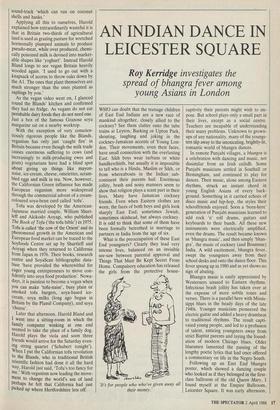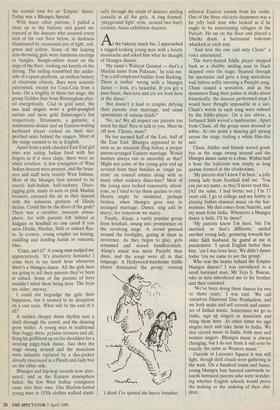AN INDIAN DANCE IN LEICESTER SQUARE
spread of bhangra fever among young Asians in London
WHO can doubt that the teenage children of East End Indians are a new race of mankind altogether, closely allied to the cockney? See them clatter onto the tube trains at Leyton, Barking or Upton Park, shouting, laughing and joking in the cockney-Jamaican accents of Young Lon- don. Their movements, even their faces, have small connection with the everlasting East. Sikh boys wear turbans or white handkerchiefs, but usually it is impossible to tell who is a Hindu, Muslim or Sikh, or from whereabouts in the Indian sub- continent their parents hail. Enormous jollity, brash and noisy manners seem to show that religion plays a scant part in their lives. Many have Jamaican cockney friends. Even when Eastern clothes are worn, the faces of both boys and girls look sharply East End; sometimes Jewish, sometimes skinhead, but always cockney. It is odd to think that some of them have been formally betrothed in marriage to partners in India from the age of six. What is the preoccupation of these East End youngsters? Clearly they lead very intense lives, balanced on an invisible see-saw between parental approval and Things That Must Be Kept Secret From Home. Compulsory education has released the girls from the protective, house- It's for people who who've given away all their money.' captivity their parents might wish to im- pose. But school plays only a small part in their lives, except as a social centre. Teachers are incapable of understanding their many problems. Unknown to grown- ups of any nationality, many of the youngs- ters slip away to the intoxicating, brightly-lit, romantic world of bhangra dances.
In remote Punjabi villages, a bhangra is a celebration with dancing and music, not dissimilar from an Irish ceilidh. Some Punjabi musicians settled in Southall or Birmingham, and continued to play for dances. Their music, alone among Eastern rhythms, struck an instant chord in young English Asians of every back- ground. Something in it carried echoes of disco music and hip-hop, the styles their schoolfriends enjoyed. Soon a 'born-here' generation of Punjabi musicians learned to add rock 'n' roll drums, guitars and keyboards to their bands. All these new instruments were electrically amplified, even the drums. The result became known as 'bhangra music', and then simply 'bhan- gra', the music of cockney (and Brummie) India. A wild excitement, bhangra fever, swept the youngsters away from their school desks and onto the dance floor. This fever sprang up in 1980 and as yet shows no sign of abating.
Bhangra music is easily appreciated by Westerners unused to Eastern rhythms. Infectious brash jollity has taken over at the expense of more subtle tones and verses. There is a parallel here with Missis- sippi blues in the heady days of the late 1940s. Younger musicians pioneered the electric guitar and added a heavy drumbeat to traditional rhythms. The result capti- vated young people, and led to a profusion of talent, enticing youngsters away from strict Baptist parents and laying the found- ation of modern Chicago blues. Older bluesmen lamented the passing of the lengthy poetic lyrics that had once offered a commentary on life in the Negro South. Following up an East End bhangra poster, which showed a dancing couple who looked as if they belonged in the first- class ballroom of the old Queen Mary, I found myself at the Empire Ballroom, Leicester Square. It was early afternoon, the normal time for an 'Empire' dance. Today was a Bhangra Special.
With many other patrons, I pulled a chair up to the balcony and gazed en- tranced at the dancers who covered every inch of the vast floor below, in darkness illuminated by occasional jets of light, red, green and yellow. Some of the leaping arm-throwing girls wore luminous earrings or bangles. Bangle-sellers stood on the edge of the floor, looking out keenly on the throng. The ceiling resembled the under- side of a space-platform, an endless battery of electronic objects. Bars were scarcely patronised, except for Coca-Cola from a hose. On a brightly lit three-tier stage, the group Golden Star from Birmingham play- ed energetically. Clad in gold lame, the two lead singers wore a gold-spangled turban and neon gold fishmonger's hat respectively. Drummers, a guitarist, a tambourine-shaker and an Eastern-wailing keyboard player rocked on their tier- perched seats behind the singers. Most of the songs seemed to be in English.
Apart from a pink-cheeked East End girl who was eating Indian food with her fingers as if it were chips, there were no white revellers. A few youngsters of West Indian descent were present, and the boun- cers and staff were mainly West Indians. Most of the bhangra fans seemed to be exactly half-Indian, half-cockney. Disco- jigging girls, many in saris or pink Muslim trousers, caressed the air as they danced with the sensuous gestures of Hindu deities. Could this be the disco of the gods? There was a carefree, innocent atmos- phere. for with parents left behind at Aldgate or Southall no one cared if you were Hindu, Muslim, Sikh or indeed Ras- ta. In corners, young couples sat kissing, cuddling and holding hands in romantic bliss.
'Crazy, isn't it?' A young man nudged me appreciatively. 'It's absolutely fantastic! I come here in my lunch hour whenever there's a bhangra dance. All the girls here are going to tell their parents they've been at school. Some of the parents of boys wouldn't mind them being here. The boys are older, anyway.'
I could not begrudge the girls their happiness, but it seemed to be deception on a vast scale. What will be the end of it all?
A sudden choppy drum rhythm sent a thrill through the crowd, and the dancing grew wilder. A young man in traditional blue baggy dress, pyjama trousers and all, flung his girlfriend up on his shoulders for a swaying piggy-back dance. Just then the stage swung around and the musicians were instantly replaced by a disc-jockey already ensconced in a Punch and Judy box on the other side.
Bhangra and hip-hop records now alter- nated, and as the Eastern atmosphere faded, the few West Indian youngsters came into their own. One Harlem-hatted young man in 1930s clothes walked elasti- cally through the crush of dancers smiling casually at all the girls. A ring formed, 'playground fight' style, around two burly cockney Asian exhibition dancers.
At the balcony snack bar, I approached a rugged-looking young man with a bristly moustache and asked him what he thought of bhangra dances.
'My name's Walayat Quamar — that's a Muslim name from Pakistan,' he told me. 'I'm a self-employed builder from Barking. There is nothin' wrong with a bhangra dance — look, it's beautiful. If you got a pure heart, then love and joy are both here at the dance.'
Tut doesn't it lead to couples defying their parents over marriage, and cause upsetments of various kinds?'
'No, no! We all respect our parents too much for that! Nice to talk to you. Must be off now. Cheers, mate!'
He too seemed half of the East, half of the East End. Bhangra appeared to be seen as an innocent fling before a proper parent-arranged Eastern marriage. Would matters always run as smoothly as that? Might not some of the young girls end up severed from their families as 'single pa- rents' on council estates along with so many other cockney disco-fans? Most of the young men looked reasonably chival- rous, so I tried to lay these qualms to rest. Hearts might be sundered, perhaps broken, when bhangra gave way to arranged marriage. Dance, sing and be merry, for tomorrow we marry.
Finally, Alaap, a vastly popular group from Southall, swung into prominence on the revolving stage. A crowd pressed around the footlights, gazing at them in reverence. As they began to play, girls screamed and waved handkerchiefs. Alaap's music was more Punjabi than disco, and the songs were all in that language. A Hollywood-handsome fiddle player dominated the group, coaxing 'I think I've spotted the heavy breather.' ethereal Eastern sounds from his violin. One of the three old-style drummers was a fat jolly bald man who looked as if he ought to be entertaining villagers in the Punjab. He sat on the floor and played a Dholki drum, a horizontal tom-tom whacked at each end.
'And now the one and only Chani!' a voice announced.
The wavy-haired fiddle player stepped back as a chubby smiling man in black skipped onto the stage, beamed through his spectacles and gave a long melodious wail before softly intoning a Punjabi song. Chani caused a sensation, and as the drummers flung their palms or sticks about frenetically, the dancers performed steps I would have thought impossible in a sari. Chani's words in each song were echoed by the fiddle-player. On a tier above, a turbaned Sikh waved a tambourine. Apart from Chani, all the group were dressed in white. At one point a dancing girl sprang across the stage trailing a white film-like sari.
Chani, fiddler and friends waved good- bye as the stage swung around and the bhangra dance came to a close. Within half a hour the ballroom was empty as long queues formed at the cloakrooms.
'My parents don't know I'm here,' a jolly young lady from Southall told me. 'You can put my name, as they'll never read this. [All the same, I had better not.] I'm 17 years old, I go to college and my hobby is playing Indian classical music on the har- monium. My dad comes from Nairobi, and my mum from India. Whenever a bhangra dance is held, I'll be there!'
'My parents know I'm here, but I'm married, so that's different,' smiled another young lady, gesturing towards her older Sikh husband. he gazed at me in puzzlement. 'I speak English better than him, 'cos I was born here. We didn't dance today 'cos we came to see the group.'
Who was the brains behind the Empire bhangra dances? I was introduced to a small harassed man, Mr Teja S. Basran, who in turn introduced me to his brother and then vanished.
'We've been doing these dances for two or three years,' I was told. 'We call ourselves Diamond Disc Production, and we both make and sell records and casset- tes of Indian music. Sometimes we go to India, sign up singers or musicians and bring them here. At other times we sign singers here and take them to India. We also record music in India, both men and women singers. Bhangra music is always changing, but I do not think it will ever be exactly the same as Western music.'
Outside in Leicester Square it was still light, though dark clouds were gathering in the west. On a hundred trains and buses, young bhangra fans hurried eastwards to- wards bemused parents who were wonder- ing whether English schools would prove the making or the undoing of their chil- dren.



















































 Previous page
Previous page